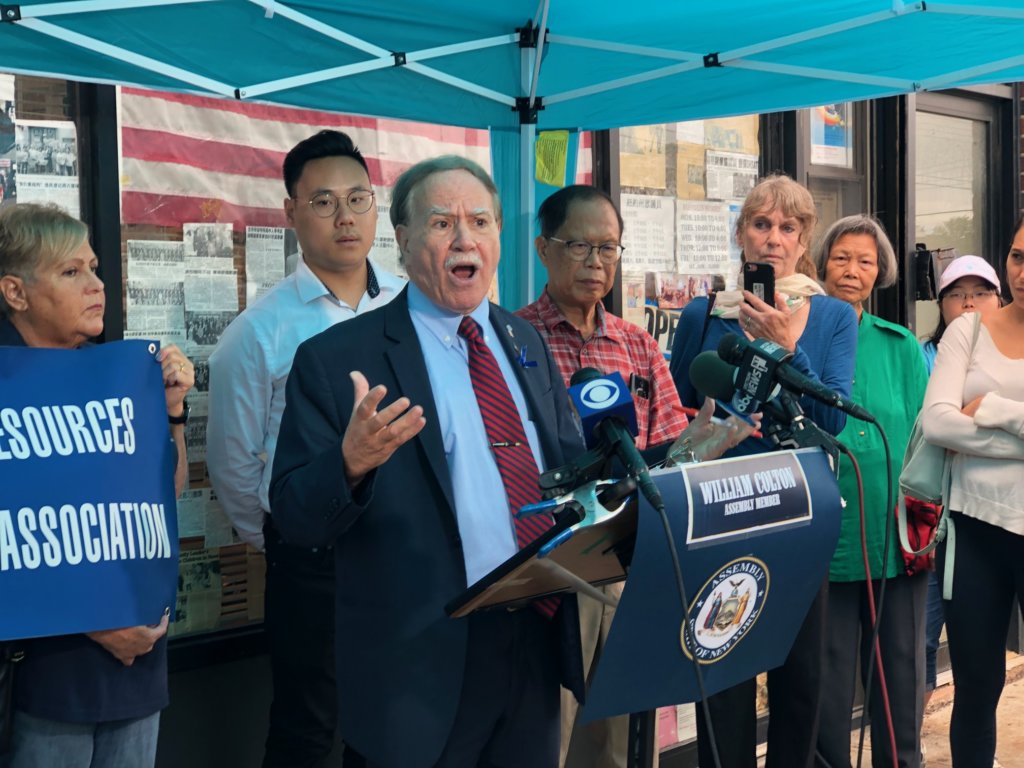GRAVESEND — National Grid is holding customers hostage by refusing to supply new gas hook-ups unless the New York State Department of Environmental Conservation grants a permit to an Oklahoma-based company to build a controversial $1 billion gas pipeline, Brooklyn lawmakers and local homeowners charged.
Residents and civic leaders spoke out at a press conference Assemblymember Bill Colton held outside his Gravesend office on Friday and demanded that National Grid turn the gas on.
Hundreds of customers in Brooklyn are currently without gas, according to Colton.
National Grid, which enjoys a legal monopoly to supply gas to parts of New York State, announced earlier this year that it would not process any new applications for gas service unless
DEC grants a permit to Williams Companies, Inc. of Oklahoma to construct a 37-mile-long gas pipeline from New Jersey to New York that would allow National Grid to increase its gas capacity by 14 percent.
The pipeline, part of a Northeast Supply Enhancement Project, would be constructed underwater.
DEC rejected Williams’ previous permit application on the grounds that the company had not offered a detailed plan on how it would mitigate any environmental concerns. The construction process could unleash mercury and copper into New York’s waterways, DEC said in its rejection notice. Williams has re-applied for a permit.
But the tense standoff is hurting working families and mom-and-pop businesses, according to Colton, who represents Gravesend and part of Bensonhurst and Dyker Heights.
“We are dealing with an emergency in our community,” Colton said. Houses, businesses and community-based organizations are all caught in a bind, he added.
The moratorium affects people seeking new gas service as well as those looking to have the gas turned back on after it had been off, Colton said.
Julie Levine said she bought a home and spent months renovating it only to learn that National Grid wouldn’t turn her gas on. “We bought a house in Park Slope. We spent our life savings renovating it. I called the gas company and was told they will not be providing me with gas,” she said, adding that she had played by the rules and had the gas turned off during the renovations because that is what she was required to do.
Levine said she and her family can’t move out of their apartment and into their newly renovated house. “We have nowhere to go. Our lease is up in a month,” she said.
Ansen Tang, office manager at the United Chinese Association of Brooklyn, said the organization, which operates out of a two-story building at 1787 Stillwell Ave. in Gravesend, might have to shut down its programs in the winter.

UCA provides English language lessons, yoga, student enrichment programs and food for senior citizens at its Stillwell Avenue center.
UCA’s center is located on the first floor of the building. The building owner is seeking to rent the second floor to a new tenant and wants separate gas lines serving each floor. UCA would need a new gas line on the first floor, according to Tang, who said National Grid refused the request.
“We cannot operate our center,” Tang said, adding UCA serves more than 500 people who come to UCA “to have a better quality of life.”
Colton charged that by refusing to service customers, National Grid is committing “a serious violation” of its agreement with the New York State Public Service Commission. The agreement allows National Grid to operate a monopoly.
Councilmember Mark Treyger, who represents Coney Island, Gravesend and parts of Bensonhurst, said the gas service moratorium disproportionately affects working people. A major corporation can afford to wait months or longer for a gas hook-up, he said. But a small, mom-and-pop business cannot afford to wait. “This is a crisis,” he said.
Treyger sought to cast doubt on National Grid’s assertions that it needs the Williams pipeline. “National Grid does not have a gas supply problem. They have a greed problem,” he said.
“They have politicized their greed,” Treyger added.
Indeed, customers who were refused gas service reported that National Grid urged them to call on their state legislators to support the Williams pipeline.
Karen Young, a spokesperson for National Grid, sent the Home Reporter a statement from the company defending its policy.
“We’re equally as frustrated that we can’t serve requests for new or expanded gas service safely and reliably for our customers and communities without the necessary approvals for the Northeast Supply Enhancement Project (NESE). The infrastructure serving the region with gas supply has reached full capacity and is unable to meet growing demand. To add additional service without NESE would pose a risk to the operational integrity of our system and jeopardize reliability of service for the existing 1.8 million customers,” the statement reads.

 ADAMS FOR MAYOR: Eric Will Lift A Lamp “Beside The Golden Door”
ADAMS FOR MAYOR: Eric Will Lift A Lamp “Beside The Golden Door”